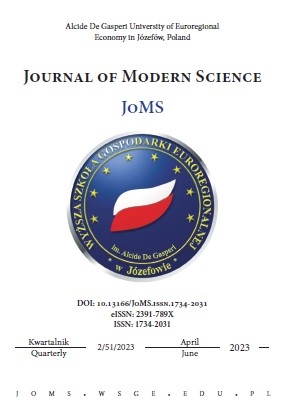PSYCHOLOGICAL PROTECTIVE FACTORS AND INDIVIDUAL FUNCTIONING DURING THE COVID-19 PANDEMIC
PSYCHOLOGICAL PROTECTIVE FACTORS AND INDIVIDUAL FUNCTIONING DURING THE COVID-19 PANDEMIC
Author(s): MARLENA WANDA STRADOMSKA, Karolina Perec, Mateusz BarłógSubject(s): Psychology of Self, Behaviorism, Health and medicine and law, Social Norms / Social Control
Published by: Wydawnictwo Akademii Nauk Stosowanych WSGE im. A. De Gasperi w Józefowie
Keywords: physical health; mental health; optimism mental health; pandemic; Covid-19; population;
Summary/Abstract: Background: This article summarizes considerations regarding physical and mental health and optimism during the Covid-19 pandemic. The research goal is to answer questions about coping with emotions, optimism, and the general attitude to the situation related to the emergence of an epidemic that threatens the health and life of the population. Material and methods: The tools used in the study were the CECS questionnaire measuring the expression of emotions in the Polish adaptation of Juczyński and the LOT-R questionnaire of optimism in the Polish adaptation of Poprawa and Juczyński, as well as the original questionnaire on key spheres of functioning in a pandemic. Results: The analysis of the obtained results indicates the importance of psycho-logical resources, such as optimism and expression of emotions, for functioning during the epidemic. The study was conducted in the first quarter of 2020 on a group of 302 people aged 13 to 56 (M = 24,4, SD = 5,1). It turns out that knowledge about Covid-19 positively correlates with the level of optimism (rs = 0,131; p = 0,01). Greater optimism indicates greater control over a situation, such as quarantine. However, the possessed information about Covid-19 is not related to the expression of emotions – anger (rs = – 0,004; p =0,471), depression (rs = – 0,009; p = 0,438) and anxiety (rs = 0,065; p=0,13). Conclusions: The key practical implications that make up the preventive dimension of this issue were presented. Important issues during a pandemic are informing about the difficulties and challenges related to a stressful situation, working on improving interpersonal contacts, as well as cooperation with a psychologist, psychiatrist or psychotherapist. In summary, it may be crucial to plan activities aimed at spreading knowledge and controlling emotions in a personal and professional aspect.
Journal: Journal of Modern Science
- Issue Year: 51/2023
- Issue No: 2
- Page Range: 405-420
- Page Count: 16
- Language: English
- Content File-PDF

